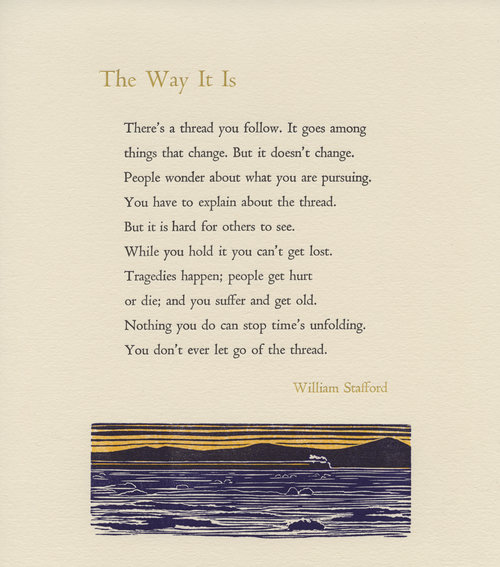
William Stafford wrote over 20,000 poems. My favorite quote about Stafford’s prolificness (prolificity?) comes from our local paper, The Oregonian:
“Writing every day resulted in about 20,000 completed or attempted poems; only about 6,000 have been published.”
ONLY 6,000… I imagine the author of that article has a dry sense of humor. It’s the “20,000 completed or attempted poems” that intrigues me, however. Stafford woke up early every day and wrote. His advice to others about what to do when they can’t write?
“Lower your standards and keep writing.”
An oft-quoted line but one that requires a deeper exploration than it usually gets. After watching the documentary Discovering William Stafford: An Oregon Art Beat Special, I went to my shelves in search of Stafford’s book You Must Revise Your Life only to realize I don’t own it (I should remedy that. The title alone inspires me to be a better writer and person). I do have, however, two copies of Writing the Australian Crawl. I pulled the copy without his signature from the shelf. In it, Sanford Pisker interviews Stafford and the topic of writing blocks is explored in more detail:
Writing blocks? I don’t believe in them. [Stafford]
But what if somebody has one? Doesn’t that person have to believe in them? You do not suffer from then, but surely other people do. [Pisker]
No, I’ve never experienced anything like that. I believe that the so-called “writing block” is a product of some kind of disproportion between your standards and your performance. I can imagine a person beginning to feel that he’s not able to write up to that standard he imagines the world has set for him. But to me that’s surrealistic. The only standard I can rationally have is the standard I’m meeting right now. Of course I can write. Anybody can write. People might think that their product is not worthy of the person they assume they are. But it is. [Stafford]
So what if a writing block has nothing to do with writing at all? What if it isn’t because you’ve run out of things to say or because the muses have abandoned you or because your talent as a writer has suddenly left your body? What if it is ONLY about performance? When that blank page is in front of me and I begin to struggle, is the struggle really about the lack of words and language or is it merely performance anxiety?
“Lower your standards and keep writing”, for me, translates into “This is a page, not a stage. Let the performance anxiety go. Write.”
Your mileage may vary, of course. What would it take for you to reconsider the notion of the writing block and to “lower your standards” instead?

1 thought on “Strategy: William Stafford — “Lower your standards””